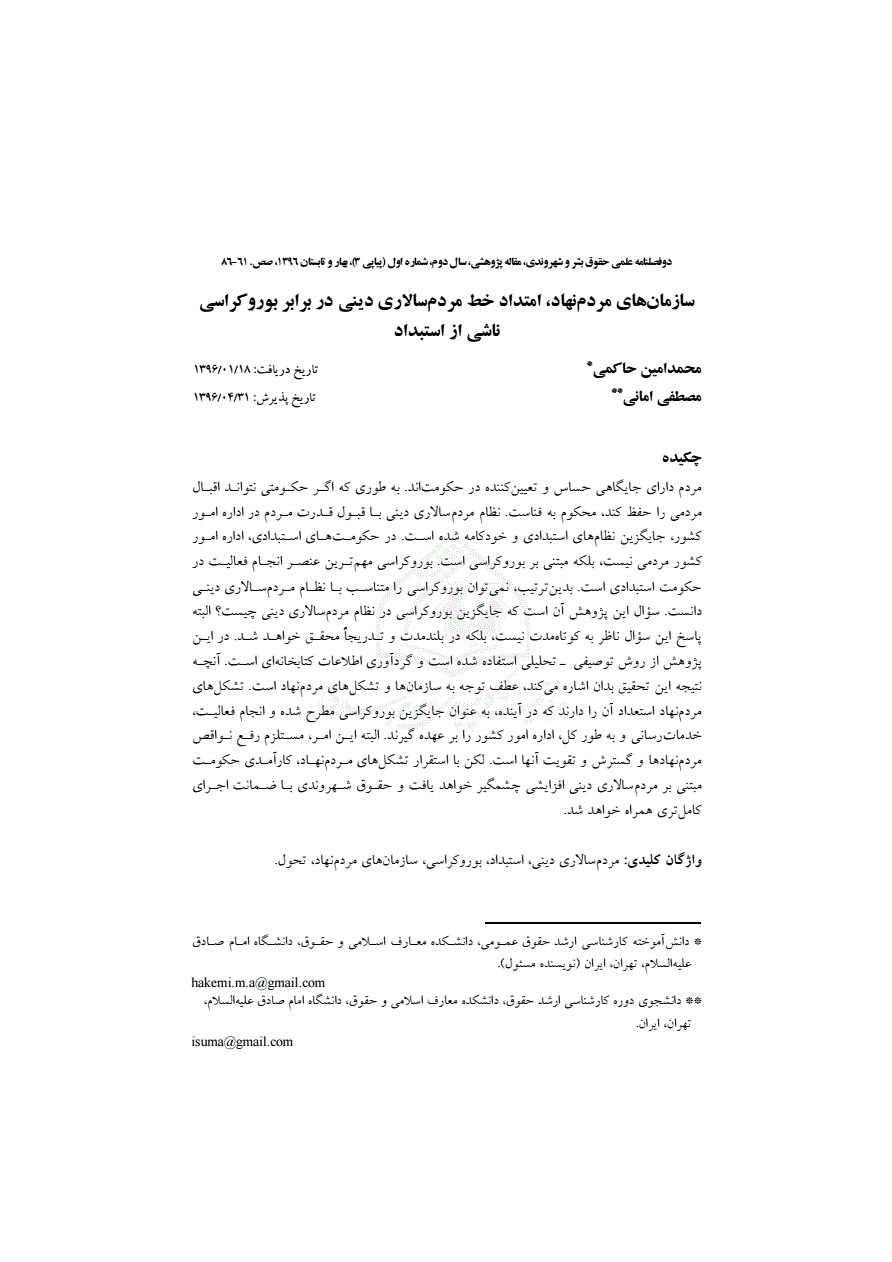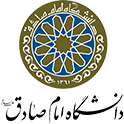
نویسنده مسئول: حاکمی، محمدامین ؛
نویسنده: امانی، مصطفی ؛
حقوق بشر و شهروندی بهار و تابستان 1396 - شماره 3 (26 صفحه - از 61 تا 86 )
- دریافت فایل ارجاع :
-
(پژوهیار,
,
,
)
-
-

تحتاج دخول لعرض محتوى المقالة. إذا لم تكن عضوًا ، فتابع من الجزء الاشتراک.
إن كنت لا تقدر علی شراء الاشتراك عبرPayPal أو بطاقة VISA، الرجاء ارسال رقم هاتفك المحمول إلی مدير الموقع عبر
webmaster@noormags.com
.
You need Sign in to view the content of the article. If you are not a member, proceed from part Sign up.
If you fail to purchase subscription via PayPal or VISA Card, please send your mobile number to the Website Administrator via
webmaster@noormags.com
.
تحتاج دخول لعرض محتوى المقالة. إذا لم تكن عضوًا ، فتابع من الجزء الاشتراک.
إن كنت لا تقدر علی شراء الاشتراك عبرPayPal أو بطاقة VISA، الرجاء ارسال رقم هاتفك المحمول إلی مدير الموقع عبر
webmaster@noormags.com
.
You need Sign in to view the content of the article. If you are not a member, proceed from part Sign up.
If you fail to purchase subscription via PayPal or VISA Card, please send your mobile number to the Website Administrator via
webmaster@noormags.com
.
تحتاج دخول لعرض محتوى المقالة. إذا لم تكن عضوًا ، فتابع من الجزء الاشتراک.
إن كنت لا تقدر علی شراء الاشتراك عبرPayPal أو بطاقة VISA، الرجاء ارسال رقم هاتفك المحمول إلی مدير الموقع عبر
webmaster@noormags.com
.
You need Sign in to view the content of the article. If you are not a member, proceed from part Sign up.
If you fail to purchase subscription via PayPal or VISA Card, please send your mobile number to the Website Administrator via
webmaster@noormags.com
.
تحتاج دخول لعرض محتوى المقالة. إذا لم تكن عضوًا ، فتابع من الجزء الاشتراک.
إن كنت لا تقدر علی شراء الاشتراك عبرPayPal أو بطاقة VISA، الرجاء ارسال رقم هاتفك المحمول إلی مدير الموقع عبر
webmaster@noormags.com
.
You need Sign in to view the content of the article. If you are not a member, proceed from part Sign up.
If you fail to purchase subscription via PayPal or VISA Card, please send your mobile number to the Website Administrator via
webmaster@noormags.com
.
تحتاج دخول لعرض محتوى المقالة. إذا لم تكن عضوًا ، فتابع من الجزء الاشتراک.
إن كنت لا تقدر علی شراء الاشتراك عبرPayPal أو بطاقة VISA، الرجاء ارسال رقم هاتفك المحمول إلی مدير الموقع عبر
webmaster@noormags.com
.
You need Sign in to view the content of the article. If you are not a member, proceed from part Sign up.
If you fail to purchase subscription via PayPal or VISA Card, please send your mobile number to the Website Administrator via
webmaster@noormags.com
.
تحتاج دخول لعرض محتوى المقالة. إذا لم تكن عضوًا ، فتابع من الجزء الاشتراک.
إن كنت لا تقدر علی شراء الاشتراك عبرPayPal أو بطاقة VISA، الرجاء ارسال رقم هاتفك المحمول إلی مدير الموقع عبر
webmaster@noormags.com
.
You need Sign in to view the content of the article. If you are not a member, proceed from part Sign up.
If you fail to purchase subscription via PayPal or VISA Card, please send your mobile number to the Website Administrator via
webmaster@noormags.com
.
تحتاج دخول لعرض محتوى المقالة. إذا لم تكن عضوًا ، فتابع من الجزء الاشتراک.
إن كنت لا تقدر علی شراء الاشتراك عبرPayPal أو بطاقة VISA، الرجاء ارسال رقم هاتفك المحمول إلی مدير الموقع عبر
webmaster@noormags.com
.
You need Sign in to view the content of the article. If you are not a member, proceed from part Sign up.
If you fail to purchase subscription via PayPal or VISA Card, please send your mobile number to the Website Administrator via
webmaster@noormags.com
.
تحتاج دخول لعرض محتوى المقالة. إذا لم تكن عضوًا ، فتابع من الجزء الاشتراک.
إن كنت لا تقدر علی شراء الاشتراك عبرPayPal أو بطاقة VISA، الرجاء ارسال رقم هاتفك المحمول إلی مدير الموقع عبر
webmaster@noormags.com
.
You need Sign in to view the content of the article. If you are not a member, proceed from part Sign up.
If you fail to purchase subscription via PayPal or VISA Card, please send your mobile number to the Website Administrator via
webmaster@noormags.com
.
تحتاج دخول لعرض محتوى المقالة. إذا لم تكن عضوًا ، فتابع من الجزء الاشتراک.
إن كنت لا تقدر علی شراء الاشتراك عبرPayPal أو بطاقة VISA، الرجاء ارسال رقم هاتفك المحمول إلی مدير الموقع عبر
webmaster@noormags.com
.
You need Sign in to view the content of the article. If you are not a member, proceed from part Sign up.
If you fail to purchase subscription via PayPal or VISA Card, please send your mobile number to the Website Administrator via
webmaster@noormags.com
.
تحتاج دخول لعرض محتوى المقالة. إذا لم تكن عضوًا ، فتابع من الجزء الاشتراک.
إن كنت لا تقدر علی شراء الاشتراك عبرPayPal أو بطاقة VISA، الرجاء ارسال رقم هاتفك المحمول إلی مدير الموقع عبر
webmaster@noormags.com
.
You need Sign in to view the content of the article. If you are not a member, proceed from part Sign up.
If you fail to purchase subscription via PayPal or VISA Card, please send your mobile number to the Website Administrator via
webmaster@noormags.com
.
تحتاج دخول لعرض محتوى المقالة. إذا لم تكن عضوًا ، فتابع من الجزء الاشتراک.
إن كنت لا تقدر علی شراء الاشتراك عبرPayPal أو بطاقة VISA، الرجاء ارسال رقم هاتفك المحمول إلی مدير الموقع عبر
webmaster@noormags.com
.
You need Sign in to view the content of the article. If you are not a member, proceed from part Sign up.
If you fail to purchase subscription via PayPal or VISA Card, please send your mobile number to the Website Administrator via
webmaster@noormags.com
.
تحتاج دخول لعرض محتوى المقالة. إذا لم تكن عضوًا ، فتابع من الجزء الاشتراک.
إن كنت لا تقدر علی شراء الاشتراك عبرPayPal أو بطاقة VISA، الرجاء ارسال رقم هاتفك المحمول إلی مدير الموقع عبر
webmaster@noormags.com
.
You need Sign in to view the content of the article. If you are not a member, proceed from part Sign up.
If you fail to purchase subscription via PayPal or VISA Card, please send your mobile number to the Website Administrator via
webmaster@noormags.com
.
تحتاج دخول لعرض محتوى المقالة. إذا لم تكن عضوًا ، فتابع من الجزء الاشتراک.
إن كنت لا تقدر علی شراء الاشتراك عبرPayPal أو بطاقة VISA، الرجاء ارسال رقم هاتفك المحمول إلی مدير الموقع عبر
webmaster@noormags.com
.
You need Sign in to view the content of the article. If you are not a member, proceed from part Sign up.
If you fail to purchase subscription via PayPal or VISA Card, please send your mobile number to the Website Administrator via
webmaster@noormags.com
.
تحتاج دخول لعرض محتوى المقالة. إذا لم تكن عضوًا ، فتابع من الجزء الاشتراک.
إن كنت لا تقدر علی شراء الاشتراك عبرPayPal أو بطاقة VISA، الرجاء ارسال رقم هاتفك المحمول إلی مدير الموقع عبر
webmaster@noormags.com
.
You need Sign in to view the content of the article. If you are not a member, proceed from part Sign up.
If you fail to purchase subscription via PayPal or VISA Card, please send your mobile number to the Website Administrator via
webmaster@noormags.com
.
تحتاج دخول لعرض محتوى المقالة. إذا لم تكن عضوًا ، فتابع من الجزء الاشتراک.
إن كنت لا تقدر علی شراء الاشتراك عبرPayPal أو بطاقة VISA، الرجاء ارسال رقم هاتفك المحمول إلی مدير الموقع عبر
webmaster@noormags.com
.
You need Sign in to view the content of the article. If you are not a member, proceed from part Sign up.
If you fail to purchase subscription via PayPal or VISA Card, please send your mobile number to the Website Administrator via
webmaster@noormags.com
.
تحتاج دخول لعرض محتوى المقالة. إذا لم تكن عضوًا ، فتابع من الجزء الاشتراک.
إن كنت لا تقدر علی شراء الاشتراك عبرPayPal أو بطاقة VISA، الرجاء ارسال رقم هاتفك المحمول إلی مدير الموقع عبر
webmaster@noormags.com
.
You need Sign in to view the content of the article. If you are not a member, proceed from part Sign up.
If you fail to purchase subscription via PayPal or VISA Card, please send your mobile number to the Website Administrator via
webmaster@noormags.com
.
تحتاج دخول لعرض محتوى المقالة. إذا لم تكن عضوًا ، فتابع من الجزء الاشتراک.
إن كنت لا تقدر علی شراء الاشتراك عبرPayPal أو بطاقة VISA، الرجاء ارسال رقم هاتفك المحمول إلی مدير الموقع عبر
webmaster@noormags.com
.
You need Sign in to view the content of the article. If you are not a member, proceed from part Sign up.
If you fail to purchase subscription via PayPal or VISA Card, please send your mobile number to the Website Administrator via
webmaster@noormags.com
.
تحتاج دخول لعرض محتوى المقالة. إذا لم تكن عضوًا ، فتابع من الجزء الاشتراک.
إن كنت لا تقدر علی شراء الاشتراك عبرPayPal أو بطاقة VISA، الرجاء ارسال رقم هاتفك المحمول إلی مدير الموقع عبر
webmaster@noormags.com
.
You need Sign in to view the content of the article. If you are not a member, proceed from part Sign up.
If you fail to purchase subscription via PayPal or VISA Card, please send your mobile number to the Website Administrator via
webmaster@noormags.com
.
تحتاج دخول لعرض محتوى المقالة. إذا لم تكن عضوًا ، فتابع من الجزء الاشتراک.
إن كنت لا تقدر علی شراء الاشتراك عبرPayPal أو بطاقة VISA، الرجاء ارسال رقم هاتفك المحمول إلی مدير الموقع عبر
webmaster@noormags.com
.
You need Sign in to view the content of the article. If you are not a member, proceed from part Sign up.
If you fail to purchase subscription via PayPal or VISA Card, please send your mobile number to the Website Administrator via
webmaster@noormags.com
.
تحتاج دخول لعرض محتوى المقالة. إذا لم تكن عضوًا ، فتابع من الجزء الاشتراک.
إن كنت لا تقدر علی شراء الاشتراك عبرPayPal أو بطاقة VISA، الرجاء ارسال رقم هاتفك المحمول إلی مدير الموقع عبر
webmaster@noormags.com
.
You need Sign in to view the content of the article. If you are not a member, proceed from part Sign up.
If you fail to purchase subscription via PayPal or VISA Card, please send your mobile number to the Website Administrator via
webmaster@noormags.com
.
تحتاج دخول لعرض محتوى المقالة. إذا لم تكن عضوًا ، فتابع من الجزء الاشتراک.
إن كنت لا تقدر علی شراء الاشتراك عبرPayPal أو بطاقة VISA، الرجاء ارسال رقم هاتفك المحمول إلی مدير الموقع عبر
webmaster@noormags.com
.
You need Sign in to view the content of the article. If you are not a member, proceed from part Sign up.
If you fail to purchase subscription via PayPal or VISA Card, please send your mobile number to the Website Administrator via
webmaster@noormags.com
.
تحتاج دخول لعرض محتوى المقالة. إذا لم تكن عضوًا ، فتابع من الجزء الاشتراک.
إن كنت لا تقدر علی شراء الاشتراك عبرPayPal أو بطاقة VISA، الرجاء ارسال رقم هاتفك المحمول إلی مدير الموقع عبر
webmaster@noormags.com
.
You need Sign in to view the content of the article. If you are not a member, proceed from part Sign up.
If you fail to purchase subscription via PayPal or VISA Card, please send your mobile number to the Website Administrator via
webmaster@noormags.com
.
تحتاج دخول لعرض محتوى المقالة. إذا لم تكن عضوًا ، فتابع من الجزء الاشتراک.
إن كنت لا تقدر علی شراء الاشتراك عبرPayPal أو بطاقة VISA، الرجاء ارسال رقم هاتفك المحمول إلی مدير الموقع عبر
webmaster@noormags.com
.
You need Sign in to view the content of the article. If you are not a member, proceed from part Sign up.
If you fail to purchase subscription via PayPal or VISA Card, please send your mobile number to the Website Administrator via
webmaster@noormags.com
.
تحتاج دخول لعرض محتوى المقالة. إذا لم تكن عضوًا ، فتابع من الجزء الاشتراک.
إن كنت لا تقدر علی شراء الاشتراك عبرPayPal أو بطاقة VISA، الرجاء ارسال رقم هاتفك المحمول إلی مدير الموقع عبر
webmaster@noormags.com
.
You need Sign in to view the content of the article. If you are not a member, proceed from part Sign up.
If you fail to purchase subscription via PayPal or VISA Card, please send your mobile number to the Website Administrator via
webmaster@noormags.com
.
